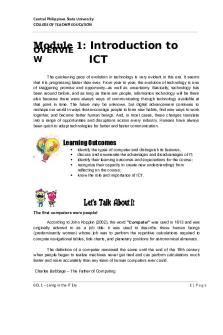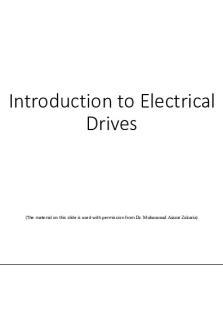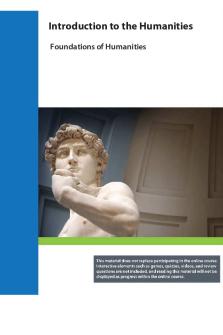Module Introduction 2019-20 PDF

| Title | Module Introduction 2019-20 |
|---|---|
| Author | Ariadne Pang |
| Course | Elements Of The Law Of Contract |
| Institution | King's College London |
| Pages | 6 |
| File Size | 157.1 KB |
| File Type | |
| Total Downloads | 40 |
| Total Views | 151 |
Summary
Handouts...
Description
Elements of the Law of Contract 2019-20 The What, How, Why and Who of Contract Law 1. What Structure of the module and the topics to be covered Semester 1 begins with a consideration of those matters necessary to form a contract (offer and acceptance, consideration, third party rights, intention to create legal relations and incomplete and uncertain agreements). The semester concludes with a consideration of those elements which vitiate an apparent contract – that is – those factors which either prevent a contract from arising (mistake) or allow one of the parties the right to avoid a contract (misrepresentation, duress, and undue influence). Semester 2 begins with an exploration of the question “what is a contract?”. We consider at this point contractual terms (express and implied), exemption clauses and the legislative regulation of contractual terms. The module concludes with an assessment of what happens when it all goes wrong. We are concerned here, primarily, with the discharge of contracts by frustration and breach and the remedial consequences which attend each of these events.
2. How Three different learning environments You will participate in three learning environments with active teaching. Each has its own distinct objectives. You will find a week by week schedule for the entire academic year in the Introductory section of the King’s virtual learning environment, KEATS, on the Elements of the Law of Contract section which sets out the topics to be covered each week in the lectures and the tutorials. Also included are the weeks and topics of the four research seminars. (a) Lectures – one 2-hour lecture each week. Your lecturers in Semester 1 are John Phillips (Formation) and Catharine MacMillan (Vitiating Elements). Your lecturers in Semester 2 are Ewan McGaughey (Terms) and Catharine MacMillan (Performance, Discharge and Consequences). Each lecturer prepares a list of the relevant cases and these are available on KEATS. The lectures are on Monday mornings from 9-11 AM in WAT/F-WBB.5 (in the Franklin Wilkins building, on the other side of the Waterloo Bridge to the Strand).
It is important to understand the purpose of lectures. They are not intended to provide you with a substitute or supplementary textbook. There is a practical reason for this: in the two blocks of 50 minutes a lecture occupies each week, a student can
1
read far more of a textbook than could ever be taken down in notes. There is also a more important reason. In this subject there are good textbooks, and it would be pointless to provide students with more - or less - of the same. What the lectures will do is to serve as maps of the subject, attempting to show its shape and explain its fundamental principles; at the same time, they provide the chance to go into detail in areas of difficulty or complexity, and try to impose a clear shape on those areas; and finally, they provide an opportunity to discuss a topic from an unusual perspective (which may include saying that the textbooks or the courts have made a mistake). Lectures are recorded and are available to you via Echo on Lecture capture (again, available through the Contract page of KEATS). You may find it useful to hear a lecture again. Do not be tempted, though, to use this as a substitute for reading about the subject. As will become apparent to you over this year independent study (that is to say, reading on your own) is an important and indispensable part of your law degree. (b) Tutorials – one 1 hour tutorial each week in a tutor group. Your timetable will tell you when and where your tutorial is, and who is your tutor for your tutorial sessions. (If there are two names, that means you will have a different tutor in each of the two teaching semesters, because of changes in staff availability). Required reading is set out for each tutorial. There are suggestions for further reading at the end of some topics. Individual tutors are free to prescribe additional reading. While lectures offer you an overview of a subject or a more in-depth exploration of particular aspects of a subject, they are a largely passive experience for students. In contrast, tutorials are an active experience for students. They are particularly important in the first year of your legal studies as both the subject matter of the law and legal method are new to you. While you should never be afraid to ask questions during lectures (feel free to put your hand up and at any point in the lecture. Don’t just wait till the end of the lecture you may find that the lecturer has a class elsewhere to go to), it is in tutorials and research seminars that you will be expected to make your main contribution. They serve as a method of checking your progress, and provide an opportunity to discuss areas of law which you find difficult and to find fresh perspectives on the topics which you are studying. Tutorials are a critical component in the provision of feedback to you about your understanding of the subject. Tutorials are essential in providing students the ability to develop two skills which are key to any lawyer: the ability to locate legal materials and the ability to formulate and express legal arguments addressed at resolving a practical problem. To develop the ability to locate legal materials, you will need to find some of the cases necessary for tutorial discussions using a database (eg Westlaw, LexisNexis) accessed through the King’s College Library online portal. You may also consult paper copies of law reports in the Maughan Library. In addition, you will need to locate and read excerpts of cases in the set casebook (McKendrick). Real lawyers find their own legal sources!
2
Much of the discussion will centre around problem-solving. This will require you to analyse sets of facts, find the legal issues which they raise, and apply the law which you are learning in finding a solution. This is where you will practise basic legal methods, in reading cases and statutes and in applying them. The faster you acquire the techniques of reading and understanding these primary materials, the easier life will be for you. There is a terrible stage for most new law students when work seems to be nothing more than trying to remember the half-understood "rules" laid down by the cases. This is really a back-to-front method of work, and quite unlike the way in which lawyers should operate. Your goal should be to read and understand cases and statutes, and remember them because you have understood them. There is one other point which you should remember about "problem questions". After the first week or two they will be designed to stretch your knowledge and understanding, so that you can begin to acquire the technique of extending rules and principles by analogy, and learn to reject the apparent solution where it offends against your common sense or your sense of what is right. You must always do your best to see if there is a definitive solution, but you must also realise that often there is none, or alternately, more than one arguable possibility. It is part of the lawyer's technique to create answers, and to justify them, when the rule book is exhausted. (c) Research Seminars - 2 two-hour research seminars per semester. The first research seminar is in the second week of the semester. See your individual timetable for exact time and place, and the name of your research seminar leader. (As with the tutorials, if your individual timetable shows two names, that means you will have a different tutor in each of the two teaching semesters, because of changes in staff availability). There is assigned reading for each Research Seminar and set questions to consider for discussion. Like the tutorials, prior preparation is essential. Research Seminars are similar to tutorials in that they allow you an active opportunity to raise arguments, make points and ask your seminar leader questions about the subject matter. They differ from tutorials, though, in that they are primarily concerned with exploring the academic scholarship produced about the law. In other words, they are more concerned with the question of what the law should be than what it is. And while tutorials are largely concerned with the resolution of practical problems, Research Seminars are altogether more discursive and policy based with a focus upon the general rather than the particular. As with the tutorials, another key legal skill embedded within the Research Seminars is the ability to locate relevant legal materials. Because of the discursive nature of the Research Seminars this will include not only cases but also articles which can be accessed on databases (eg Hein on Line, JStor) which are available through the King’s online library. A limited number of some paper journals can also be found in the Maughan Library. Like the tutorials, Research Seminars form a critical component in the provision of feedback to you about your understanding of the subject.
3
Study pattern for this module So, study in the pattern of: (1) go to the lecture, (2) read the relevant section in your textbook/casebook and (3) prepare for the relevant tutorial and/or research seminar - in other words, you are not necessarily expected to have read the textbook before you go to the lecture (but you may if you wish). Either way, you may find it useful to have the lecture case list with you in the lecture (especially as these are provided for you in the end of year exam – see below).
Reading The recommended text and case book are set out at the beginning of the Tutorial Programme, along with information about some other Contract books. The prescribed textbook for 2019-2020 is: J Beatson, A Burrows and J Cartwright (eds), Anson’s Law of Contract 30th edition (2016, OUP) ISBN: 978-0-19-873478-9. Recommended case book: Ewan McKendrick, Contract Law: Text, Cases and Materials 8th edn (2018, OUP) ISBN 9780-19-880816-9. Lecture, tutorial and research seminar materials make reference to these two books. You may find it helpful to consult other books and these are listed separately on a reading list which you can find in the introductory materials section of the Contract page on KEATS. Blackwell’s Book Shop will have a pop-up shop the week commencing 23 September on the 1st floor of the Franklin Wilkins Building outside the library. They have been informed which are our recommended texts, and are offering a discount price on a bundle of both books (the recommended retail price of the two books purchased separately is normally higher). While you can find these two books in the library, you will find it extremely useful to own them. In addition, you will find it important to read the major cases set out for each tutorial and the articles and cases set out for each Research Seminar. It is expected that you will locate these materials yourself through the library’s online databases. Locating legal sources and information is essential to the study of law.
Assessment 70% of the end of year assessment is based on a 2hr closed book exam, that is, you do not take any materials in yourself. However, you are supplied with the lecture case lists and any relevant statutory texts. In the exam you must answer two questions, one from Part A of the exam, and one from Part B. Each part contains two problems and one essay. Part A has questions based mainly on first semester topics; Part B is based on second semester topics (although there could be some overlap – exact separation is not guaranteed). 30% of the assessment is based on a Coursework Assessed Essay – details to follow. The Assessed Essay title(s) will be based on your Research Seminar topic(s). In addition to these two pieces of summative assessment, you will have an opportunity to undertake three formative assessments – that is to say – you will have the opportunity to practice giving written answers and receive feedback on your answers. The first two formative assessments are coursework assignments in
4
Semester 1, the third is a practice examination at the beginning of Semester 2. Details of when these formative assessments are set and due can be found on the weekly schedule posted in the Contract section of KEATS. Note that none of these formative assessments counts towards your end of year mark. Guidance to writing essays and examination questions will be provided on the Contract KEATS page.
3. Why Why study Contract Law? Well, this module is a mandatory component of the LLB and you need to take it. If you want a qualifying law degree, then you must have studied Law of Contract. However, you do make contracts every day, so it is quite interesting to know the law supporting them. We tend to focus more on principles than practicalities, but you will also learn what to shout in the shops when you want to take the broken goods back. Apart from that, more generally, in the English legal system, contract law is mainly based on case law, that is, previous case decisions made by the Supreme Court (formerly, the Judicial Committee of the House of Lords) and Court of Appeal. You therefore learn how case law works as a source of law, which involves inductive logic and living with uncertainty. n the tutorials, application of the legal rules to hypothetical factual situations (apart from being fun) is an excellent exercise in analytic reasoning and allows you practice in formulating arguments. Thus, both intrinsically and in view of transferable skills which you will acquire, study of the Elements of Contract Law is an excellent beginning to your Law Degree. It is also the case that most of private law is either based upon or conducted by reference to Contract Law. A study of Contract Law allows you study (and practic) law in these other areas.
4. Who The following people make up the Contract Law team at the Dickson Poon School of Law, King’s College London: Module Convenor Professor Catharine MacMillan ([email protected]) Lecturers Professor Catharine MacMillan Dr Ewan McGaughey ([email protected]) Professor John Phillips ([email protected])
5
Tutors Mr Harry Bithell Dr Michelle Johnson Professor Catharine MacMillan Dr Manuel Penades ([email protected]) Ms Caroline van Hensbergen ([email protected]) Dr Elin Weston ([email protected]) Research Seminar Leaders Dr Megan Bowman ([email protected]) Dr Mateja Durovic ([email protected]) Professor Catharine MacMillan Dr Colm McGrath ([email protected]) Dr Manuel Penades Professor John Phillips Professor Thomas Schultz ([email protected]) Dr Eva Steiner ([email protected])
6...
Similar Free PDFs

PCM-module 1-Introduction
- 3 Pages

Module Introduction 2019-20
- 6 Pages

Module A introduction and rubric
- 2 Pages

Introduction to Law Module Handbook
- 24 Pages

Module 1 -Introduction to Research
- 15 Pages

Module 1 Introduction To Mechanics
- 11 Pages
Popular Institutions
- Tinajero National High School - Annex
- Politeknik Caltex Riau
- Yokohama City University
- SGT University
- University of Al-Qadisiyah
- Divine Word College of Vigan
- Techniek College Rotterdam
- Universidade de Santiago
- Universiti Teknologi MARA Cawangan Johor Kampus Pasir Gudang
- Poltekkes Kemenkes Yogyakarta
- Baguio City National High School
- Colegio san marcos
- preparatoria uno
- Centro de Bachillerato Tecnológico Industrial y de Servicios No. 107
- Dalian Maritime University
- Quang Trung Secondary School
- Colegio Tecnológico en Informática
- Corporación Regional de Educación Superior
- Grupo CEDVA
- Dar Al Uloom University
- Centro de Estudios Preuniversitarios de la Universidad Nacional de Ingeniería
- 上智大学
- Aakash International School, Nuna Majara
- San Felipe Neri Catholic School
- Kang Chiao International School - New Taipei City
- Misamis Occidental National High School
- Institución Educativa Escuela Normal Juan Ladrilleros
- Kolehiyo ng Pantukan
- Batanes State College
- Instituto Continental
- Sekolah Menengah Kejuruan Kesehatan Kaltara (Tarakan)
- Colegio de La Inmaculada Concepcion - Cebu









